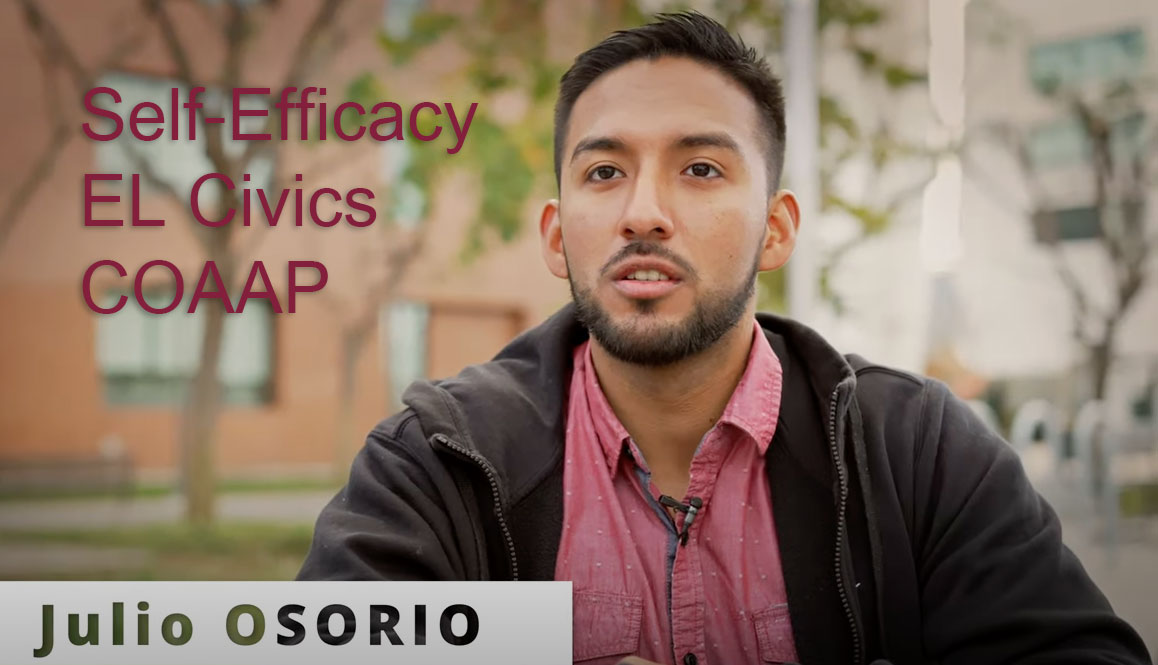EL Civics Self-Efficacy COAAP: Empowering Adult Learners: Enhancing Persistence
Submitted By: Francisco Narciso
Los Angeles Regional Adult Education Consortium
Website: https://lausdadulted.org/
Type of Practice: Learner Transition
Program Area(s): ABE / ASE, ESL / EL Civics / Citizenship, CTE / Workforce Prep / Pre-apprenticeship, Adults with Disabilities
Region: Los Angeles Basin
Consortia Involved: Los Angeles Regional Adult Education Consortium
The Program of Practice
Post-pandemic, Los Angeles Unified School District (LAUSD) Division of Adult and Career Education (DACE) schools launched robust recovery plans to meet student needs by expanding course offerings in-person and online, enhancing facilities to ensure a safe and welcoming ambiance, facilitating staff collaboration through Communities of Practice to refine instruction, and providing individualized counseling support. Despite significant growth in division-wide enrollment, student persistence remains a challenge as many continue to face personal difficulties during this period of recovery. This highlights the need for targeted interventions to help students overcome personal barriers and remain engaged in their education. The persistence issue affects not only academic achievement but also the overall effectiveness of the recovery efforts.
The Response
In collaboration with multiple stakeholders, the EL Civics Program developed a new Civic Objective and Additional Assessment Plan (COAAP) focused on self-efficacy to support persistence and student engagement. This Self-Efficacy COAAP aims to build students' self-confidence, goal-setting abilities, problem-solving skills, and resilience. The program aligns with the Social Emotional Learning priority in LAUSD’s 2022-26 Strategic Plan, promoting personal initiative among students. DACE EL Civics Advisor Paul Yung, with guidance from CASAS Program Specialist Lori Howard, drafted the language and literacy objectives and task descriptions. After an extensive review process, the Self-Efficacy rubric 55.2 won CASAS approval. DACE ESL instructors from five different schools collaborated to write the instructional content and assessments for all ESL levels. The course features a former DACE student, Julio Osorio, who serves as a role model by sharing his journey of overcoming personal barriers to achieve educational success of graduating from DACE’s ESL program, earning his HiSET diploma, and matriculating to Los Angeles Trade Technical College to pursue his AA degree. Julio’s story is integrated into the curriculum through videos, making the concepts of self-efficacy relatable and inspirational for students. The COAAP lessons are differentiated with text, pictures, video, audio, and scaffolded for all ESL levels from Beginning Low to Advanced, ensuring accessibility and engagement for all learners.
The Unique Features of the Program
The Self-Efficacy COAAP is a unique collaboration involving adult education stakeholders at all levels. It features instructional content designed by DACE EL Civics Advisor and reviewed by CASAS specialists, ensuring high-quality and relevant material. The inclusion of Julio Osorio's personal journey as a former DACE student provides a powerful, relatable example of self-efficacy in action. The program’s use of multimedia resources, accessible via QR codes, supports asynchronous learning and keeps students engaged even when they are not physically on campus. These features collectively enhance the program's impact on student engagement and persistence. Here is a link to the Self-Efficacy video series: https://www.youtube.com/playlist?list=PLbclfr-JTPaH_3KPNTDcEktXcZ57OUVS9
The Outcome
The program is intended to significantly enhance students’ persistence by building their self-efficacy. The inclusion of personal stories and multimedia resources makes the content more engaging and relatable, which can lead to higher levels of student engagement and retention. As students build self-confidence and resilience, they are more likely to overcome personal barriers and achieve their educational goals. The pass rate is 86% for students who complete this COAAP. The program's success at DACE’s Harbor Occupational Center and LA Technology Center schools suggests its potential for positive impact across other settings, making it a valuable model for enhancing student outcomes.

